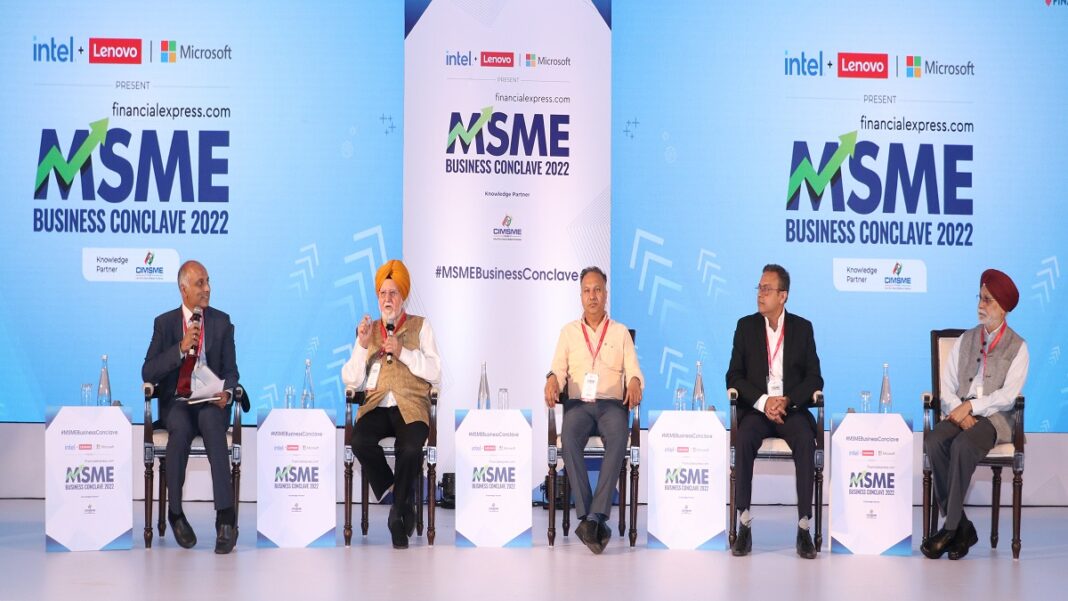Ease of Doing Business for MSMEs: All enterprises start small with a promoter on top responsible for setting up what the brand stands for, creating a healthy work culture, and most importantly driving professionalism into business. In India, a number of businesses in the MSME sector are family-owned or family-driven where in terms of succession planning, operations are simply handed over to the next generation during or after their education. However, experts at MSME Business Conclave explained where small businesses go wrong in terms of turning them into professionally-driven organisations.
The delegation of roles and responsibilities, according to panellists in a panel discussion on the subject ‘Transforming Your Business From a Promoter-driven to a Professionally-run Organisation’ on Day 2 of the conclave, is among the most critical components for promoters to take a step back from their role of being omnipresent in every business function. H S Cheema, Founder of Punjab-based Cheema Boilers, a prominent engineering solutions company manufacturing boilers for all industries and also supplying to large enterprises like Reliance said once the business grows beyond Rs 200 crore or Rs 250 crore turnover, it becomes very difficult for a promoter to manage all by himself. “Businesses don’t delegate responsibilities and hence they don’t progress.
So, delegation is a must,” said Cheema. Started in 1990 with Rs 10,000, Cheema Boilers currently is a Rs 500 crore turnover enterprise managed by a team of professionals who aren’t Cheema’s family members. “You need to bring in players who could take up the responsibility.
Businesses go wrong when they get relatives into business. But professionals that they bring in, need to be treated very carefully. For instance, in our business, we have our head of departments who have stayed with us since they joined in 1995,” Cheema added.
In contrast, the panel also had Surinder Singh Bhogal, Managing Partner at the family-run organisation Bhogal Sales Corp. The bicycle brand and an OEM supplier to several international bicycle brands in countries including Mexico, Holland, Germany, Spain, US etc. , has been in operation for the past 84 years.
According to Bhogal, who joined the company in 1972, the key to running a family business yet being professionally-driven is gainful employment and gainful compensation. “Every child entering business must have gainful employment and gainful compensation instead of joining the business right after education and getting paid more just by the virtue of being elder among siblings while younger ones receive lesser pay,” said Bhogal who has two sons in the business. The elder son, 46, was allowed to join the business after he worked at an electrical company for around a year while the younger son, 41, joined the business after working for around 2.
5 years at a telecom company. “Getting your children professionally trained is important before they enter the family business. Only then professionalism in business can come,” he added.
Bhogal Sales Corp. is divided among Bhogal and his six brothers but operates under a single parent brand. However, it goes without saying that difference of opinion exists in the promoter or professionally-run organisations.
“In the beginning, there might be thoughts in the promoter’s mind or the new generation about professionals dictating the business even as the difference of opinion is always there in a family businesses as well,” said Rajan Arora, Director, ASOP Ltd — a food processing and manufacturing company working for international and Indian grocery companies including Walmart, Amazon, Dmart, Reliance, Grofers and more. Subscribe to Financial Express SME newsletter now: Your weekly dose of news, views, and updates from the world of micro, small, and medium enterprises To drive professionalism into businesses, panellists believed professional courses offered in India don’t align with the structure of small businesses. “One of our nephews was taught about the importance of morning meetings during his management course at one of India’s premier management colleges in India.
When he returned to business, he used to sit with all HODs at 11 am for an hour meeting which is actually the prime time for our business. Over the time, it started impacting our business and we had to undo those meetings to get back to our growth track,” noted Cheema. While businesses can hire people to look after production, marketing, etc.
, when it comes to the management part of it, what people are taught at business schools is not suitable for SMEs, said Bhogal. Technology was another aspect touched upon by panellists at the session. Even as small businesses have been slow in the adoption of the latest technologies, the shift has been visible in the past decade, particularly after Covid.
“Covid taught a lot of things that without connectivity and seamless data flow you cannot make decisions,” said Sharad Verma, Head of Commercial Channel, Lenovo India. However, the challenge broadly has been the ‘microscopic’ view. “This means that people are not exploring what they can scale.
Another barrier to adoption of technology is the delay in decision making by SMEs because maybe there are too many options available to them or hesitation to adopt something which is very different from their core business,” said Verma. A survey by Crisil launched in April this year noted that over 65 per cent of around 540 micro and small enterprises (MSEs) surveyed said they had adopted or upgraded their use of digital channels for growth amid pandemic-led disruption last year. The digital usage benefitted respondents in the immediate-to-short run by helping manage transactions at a distance, deliver goods efficiently, and facilitate access to financial services, apart from bringing in tangible benefits such as enhanced customer acquisition, operational efficiency, workforce enhancement, risk management, innovation and reduction in manpower requirement, the survey had noted.
The session was moderated by TD Chandrasekhar, Partner at consultancy firm BAF Consultants which deals with matters related to family-owned businesses and their governance. .
From: financialexpress
URL: https://www.financialexpress.com/industry/sme/msme-eodb-fe-msme-business-conclave-how-small-businesses-can-transform-from-promoter-driven-to-professionally-run/2577157/



